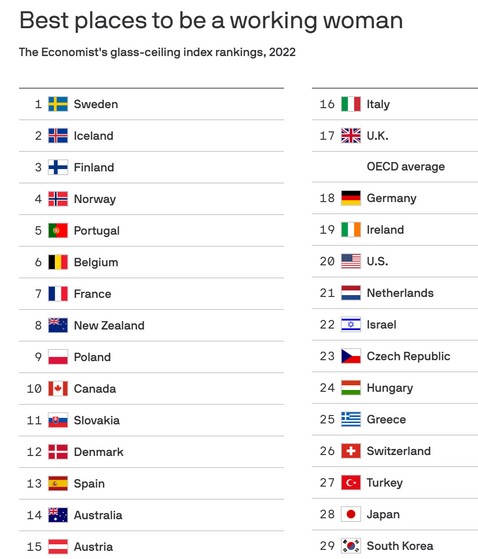֎ Women – Economist Magazine released statistics that rank nations by whether the circumstances are better for working women. The United States ranked 20th.

֎Russia – With the world glued to the crisis in Ukraine, are Americans troubled by the geopolitical scene? Even before Russia invaded the country, 52% of Americans said the conflict in Ukraine is a critical threat to U.S. vital interests. Negative perceptions of Russia are at a record high, with 85% of Americans viewing the nation unfavorably — up from 25% in 2003 and slightly edging out China at 79%, although China still is most likely to be viewed as the U.S.’s greatest enemy.
֎ China – The Chinese government is scrubbing the country’s internet of sympathetic or accurate coverage of Russia’s invasion of Ukraine and is systematically amplifying pro-Putin talking points. Chinese media outlets were told to avoid posting “anything unfavorable to Russia or pro-Western” on their social media accounts, and to only use hashtags started by Chinese state media outlets.
֎ US Supreme Court – In a victory for Democrats, the Supreme Court has turned away efforts from Republicans in North Carolina and Pennsylvania to block state court-ordered congressional districting plans. In separate orders late Monday, the justices are allowing maps selected by each state’s Supreme Court to be in effect for the 2022 elections. Those maps are more favorable to Democrats than the ones drawn by the states’ legislatures. In North Carolina, the map most likely will give Democrats an additional House seat in 2023.
֎ Atlanta Georgia – Researchers say a large spider native to East Asia that proliferated in Georgia last year could spread to much of the East Coast. The Joro  spider’s golden web took over yards all over north Georgia in 2021, unnerving some residents. The spider was also spotted in South Carolina, and entomologists expected it to spread throughout the Southeast.
spider’s golden web took over yards all over north Georgia in 2021, unnerving some residents. The spider was also spotted in South Carolina, and entomologists expected it to spread throughout the Southeast.
Researchers at the University of Georgia said in a new study it could spread even farther than that. The Joro appears better suited to colder temperatures than a related species.
֎ Airbnb said it would offer free housing to up to 100,000 people fleeing Ukraine. This is not the first time Airbnb has provided free housing. Last summer, the company also gave free, temporary housing to Afghan refugees while tens of thousands of people fled Kabul.
Airbnb is already getting a ton of support for Ukraine. As of Sunday, CEO Brian Chesky said that more than 11,000 hosts signed up to offer their homes to Ukrainians in need.
֎ Grocery stores – The humble grocery store might soon be a thing of the past. The new Whole Foods location in Washington, D.C., is showing off its techy side: It’s run by tracking and robotic tools like Amazon’s Just Walk Out technology. Cameras — not employees — follow you around while you’re shopping. When you walk out of the store, Amazon emails you a receipt, which tells you how long you shopped and how much you owe. If this sounds familiar, it’s because a lot of this tech already is used in Amazon Go convenience stores, but this is one of the first times it will be used in a 21,000-square-foot store.
֎ Mariner’s County, Iowa – Mariner recently wrote a post about the idea that government should manage ‘dignity’ rather than defensive procedures that protect ‘rights’. Mariner identified the rich citizens and the old citizens as the problem but perhaps the government itself may not be aware of the dignity its citizens deserve. Recently, mariner’s wife, a post graduate degreed librarian with over thirty years experience in research, had great difficulty determining which district in the county she and mariner were part of. Here is her accounting:
I googled districts for our County and got their website. It did not list the Districts. I googled for our County Iowa district maps and found cities and towns but could not find districts. I googled supervisors of our County, Iowa and got a very straightforward explanation of who the supervisors are, their terms of service and the districts they serve, but no indication of where those districts are located. I googled my city and got a list of services for residents, and government information for new residents–but no district map. I eventually found a site but even now, going back, I can’t retrace my steps to find it again.
Now here’s the thing–I am a reasonably literate person with access to a computer and some skill in research. I found it very interesting and frustrating that this information is not readily available to citizens. I am sure that I am not the only one who does not know what district I live in. Is it some kind of secret? And why would it be a secret in a land where the government is the people–not the parties, not the people in power, but everyday people like me. I don’t want to think that it is because the parties in power are just as happy to keep everyone else out of the loop. I would think they are eager to share the information if only people would ask. But how many people are going to call their local supervisor, who they don’t even know, and admit they don’t know the most basic information about their government?
I suggest that the everyday people need more civic education if we are going to understand our government and vote responsibly. In this world of multimedia resources at our fingertips, isn’t it interesting that I have to struggle to find out what district I live in? —
 Does the reader know the specific county voting district they live in? Their district representative’s name? Does the District care if you don’t?
Does the reader know the specific county voting district they live in? Their district representative’s name? Does the District care if you don’t?
Ancient Mariner

 ground as completely as grass and has a tiny white flower. Mariner plans to use it in some beds and places where grass just doesn’t want to grow – and the ground cover doesn’t need to be mowed!
ground as completely as grass and has a tiny white flower. Mariner plans to use it in some beds and places where grass just doesn’t want to grow – and the ground cover doesn’t need to be mowed!
 stomer service representatives, cashiers (don’t get mariner’s wife started), translators and even mortgage brokers.. . . And this is a small list. Mariner is dumbfounded by what the world will be like in 2050. Guru won’t even talk about it. Our best guess for insight may be a fortune teller, certainly not our government’s octogenarian legislators.
stomer service representatives, cashiers (don’t get mariner’s wife started), translators and even mortgage brokers.. . . And this is a small list. Mariner is dumbfounded by what the world will be like in 2050. Guru won’t even talk about it. Our best guess for insight may be a fortune teller, certainly not our government’s octogenarian legislators. s hibernation takes more of a toll every year. But just like a bear rising from the den, it’s good to stretch and rejoin Nature’s world. He refreshed the bird feeders and was pleased to see a Red-Bellied Woodpecker hammering on the suet block.
s hibernation takes more of a toll every year. But just like a bear rising from the den, it’s good to stretch and rejoin Nature’s world. He refreshed the bird feeders and was pleased to see a Red-Bellied Woodpecker hammering on the suet block.
 spider’s golden web took over yards all over north Georgia in 2021, unnerving some residents. The spider was also spotted in South Carolina, and entomologists expected it to spread throughout the Southeast.
spider’s golden web took over yards all over north Georgia in 2021, unnerving some residents. The spider was also spotted in South Carolina, and entomologists expected it to spread throughout the Southeast.